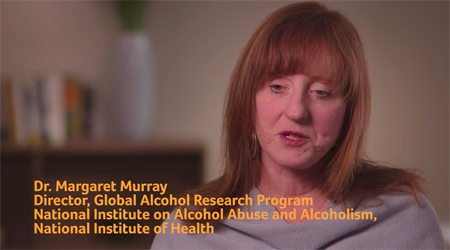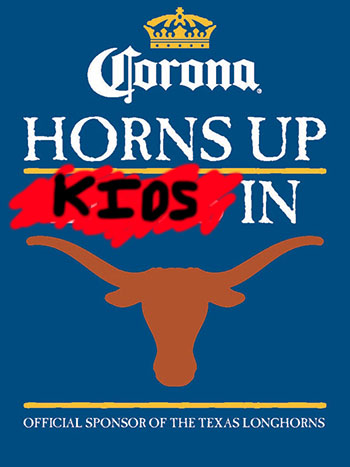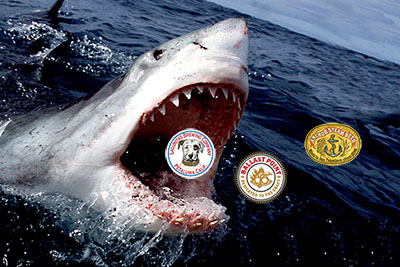In the Doghouse
NIAAA Directors Stumping for Big Alcohol
- Details
- Published: Friday, November 03 2017 18:01
 Imagine the glee the foxes would feel if the hens willingly walked into foxhouse. Less than 30 seconds into a social responsibility advertisement for alcohol giant AB InBev, we see Dr. Margaret Murray, Director of the Global Alcohol Research Program at the National Institute on Alcohol Abuse and Alcoholism (NIAAA). She briefly extols the virtues of AB InBev's "Six Cities" project. Before her, AB InBev CEO Carlos Brito introduces the company's efforts; after her, Dr. Derek Yach, AB InBev Global Advisory Council Member, asserts how their efforts will be a great benefit to the company. Dr. Murray looks calm and comfortable sandwiched between them. Later in the video, Dr. George Koob, Director of NIAAA, appears, similarly comfortable.
Imagine the glee the foxes would feel if the hens willingly walked into foxhouse. Less than 30 seconds into a social responsibility advertisement for alcohol giant AB InBev, we see Dr. Margaret Murray, Director of the Global Alcohol Research Program at the National Institute on Alcohol Abuse and Alcoholism (NIAAA). She briefly extols the virtues of AB InBev's "Six Cities" project. Before her, AB InBev CEO Carlos Brito introduces the company's efforts; after her, Dr. Derek Yach, AB InBev Global Advisory Council Member, asserts how their efforts will be a great benefit to the company. Dr. Murray looks calm and comfortable sandwiched between them. Later in the video, Dr. George Koob, Director of NIAAA, appears, similarly comfortable.
They should not feel that way. They are either being duped in the way Big Tobacco and Big Sugar (not to mention Big Alcohol!) have duped thousands before them, or they are complicit in recklessly undermining the mission of their institute.
This appearance by Dr. Murray constitutes nothing less than an abandonment of duty by a public official, argues Dr. Michael Siegel, Professor of Community Health Sciences at Boston University, in an October 30, 2017, blog post. "They are actually promoting and endorsing a company product or service. By doing so, the NIAAA has participated in a marketing ploy of the company. Essentially, NIAAA is helping Anheuser-Busch to market beer ... ," he writes.
This appearance comes hot on the heels of a major, multi-million-dollar grant from Big Alcohol to the Foundation of the National Institutes of Health. This grant is meant to fund a study the impact of regular "moderate" alcohol use in populations around the world. (There are multiple problems with that study, starting with the meaninglessness of "moderate" drinking; a 10/26/17 Wired magazine provides an excellent roundup of the controversy). Yet the Dr. Murray isn't even addressing that study. She is giving a stamp of approval to an in-house AB InBev project piloting ostensible prevention campaigns meant to reduce "hazardous drinking" by 10% in selected target cities. By doing so, she drops even the veneer of representing the research community; she is simply making AB InBev seem like a reputable source of public health research.
It is not. It cannot be. We have fifty years of experience with the research arms of Big Tobacco contributing to tobacco harm denialism. Even when ostensibly acknowledged harm, Big Tobacco has focused on "reduced harm products," and contributed voluntary prevention messaging. It turned out that reduced harm products either didn't meaningfully reduce harm or else were disliked by consumers. Both helped them put an "evidence-based" polish on continuing to deal in deadly products. And when the tobacco companies attempted to preempt the Truth/Legacy Foundation's antismoking campaigns by running in-house prevention ads, those ads turned out—surprise, surprise—to encourage underage use.
Is it a coincidence, then, that the AB InBev video extols their investment in safer products and prevention messaging?
"Industry money in research distorts research," said Carson Benowitz-Fredericks, MSPH, Research Manager at Alcohol Justice. "Industry money in prevention makes prevention ineffective. Murray and Koob know this. NIAAA has to step back into a national leadership role, not just rubber-stamp Big Alcohol's research agenda."
Dr. Siegel sees NIAAA’s participation as more than just an error in judgment. "With the promotion of Anheuser-Busch's interests that NIAAA is providing, the company hardly needs its own marketing division," he writes. "It can simply call the director of NIAAA it's de facto Director of Marketing and Public Relations. The alcohol industry couldn't have a better friend in a higher place.”
Football Sinks Deeper in the Booze Money Mire
- Details
- Published: Tuesday, August 08 2017 16:29
 Sporting events and sports broadcasts still form one of the great common grounds in America—where people of all ages, all beliefs, from all walks of life, with every kind of lived experience, can come together and be flooded with alcohol advertising. Despite escalating alcohol-related violence at NFL games, the NFL has decided to abandon its policy of rejecting hard liquor ad dollars and allow beer, liquor, rum, and other spirits to buy a place in professional football broadcasts. Not to be outdone by the pros, NCAA’s University of Texas has signed a sponsorship agreement with Corona despite the fact that binge drinking on campuses is epidemic, and a large portion of the student body is not eligible to drink.
Sporting events and sports broadcasts still form one of the great common grounds in America—where people of all ages, all beliefs, from all walks of life, with every kind of lived experience, can come together and be flooded with alcohol advertising. Despite escalating alcohol-related violence at NFL games, the NFL has decided to abandon its policy of rejecting hard liquor ad dollars and allow beer, liquor, rum, and other spirits to buy a place in professional football broadcasts. Not to be outdone by the pros, NCAA’s University of Texas has signed a sponsorship agreement with Corona despite the fact that binge drinking on campuses is epidemic, and a large portion of the student body is not eligible to drink.
The NFL’s new open-door policy comes with a few restrictions. First, liquor ads are limited to four per game, and no more than two in any quarter. Second, the ads cannot be football themed, and 20% must have a social responsibility message. (Though those campaigns may well do more harm than good.) However, the beer industry—a major investor in NFL exposure, with Budweiser paying out almost $1.5 billion for an exclusive sponsorship—carved out a major concession for letting the rival spirits industry to the table: the opportunity to advertise “flavored malt beverages,” which had also been heretofore banned. Flavored malt beverages, better known as alcopops, are Big Alcohol’s entrée of choice into underage drinkers’ hearts, stomachs, livers, and wallets.
If NFL ads fail booze companies in bringing in underage drinkers, college athletics give them a second shot. Historically, colleges have shied away from funding sports through alcohol money, realizing that, with the large number of underage undergrads, directly promoting alcohol formed a total abandonment of their responsibilities to create a healthy environment for their students. But lately, institutions of higher education have backed away from that responsibility, embracing sponsorships and co-branding while hiding behind the same "social responsibility" messaging that has done nothing at all to curb alcohol problems in the NFL. The latest warm embrace of alcohol comes from the University of Texas, whose newly minted sponsorship deal allows Corona to use UT’s “Longhorns” logo in its own advertising, along with the slogan “Horns up, limes in!” UT has failed even beyond the level which many colleges fail in curtailing alcohol use. According to the Wall Street Journal, the Longhorns’ home stadium has the highest per-capita beer sales in the country. This may explain why the Longhorns have not one but two official beers; possibly playing off currents of xenophobia, MillerCoors bought the rights to be the official domestic beer of UT.
This saturation of football with alcohol advertising needs to end. The effects on underage drinking are apparent, and the effects on alcohol-related harm on adults are becoming undeniable. It is time that sports organizations recognize that they important in the lives of fans of all ages, and stop delivering their most vulnerable viewers to their most predatory advertisers.
READ MORE about getting Big Alcohol out of sporting events.
WATCH youth-created videos that seek to Free Our Sports.
Big Alcohol Buys Out Craft On Its Way to Monopoly
- Details
- Published: Tuesday, August 08 2017 15:54
 In late July, international beer giant Sapporo announced it was acquiring Anchor Brewing, a large-but-limited, inconic San Francisco "craft" brewery. The news was met with dismay in craft brewing circles, but it falls well in line with a disturbing trend among megabrewers: buying out small brewers but continuing their labels, with an eye to flooding the shelves with faux-independent breweries. In the short run, this badgers smaller brewers off the shelves. In the long run, this is a recipe for monopoly.
In late July, international beer giant Sapporo announced it was acquiring Anchor Brewing, a large-but-limited, inconic San Francisco "craft" brewery. The news was met with dismay in craft brewing circles, but it falls well in line with a disturbing trend among megabrewers: buying out small brewers but continuing their labels, with an eye to flooding the shelves with faux-independent breweries. In the short run, this badgers smaller brewers off the shelves. In the long run, this is a recipe for monopoly.
Sapporo's acquisition was just the latest aggressive move by Big Alcohol. In May, Heineken ate Petaluma's Lagunitas. In 2015, Constellation (the parent company of Corona) bought San Diego's Ballast Point. The list goes on.
This is not merely a disappointing development for small brewers. These buyouts form the basis for Big Alcohol's current strategy to own the shelves. As NPR reports, megabrewers use these subsidiary brands in two ways: first, the multitude of captive brands allow them to flood distributors' shelves and local taps; and second, they create confusion among consumers who are trying to avoid these destructive and predatory global brands.
By grabbing for a greater market share, Big Alcohol threatens to further disintegrate an already-threatened "three tier" system. The system mandates that brewers not own distributors, but who cares about the integrity of that distinction if the distributors can't distribute anything but a megabrewer's many brands? In an era of more and more consolidation and its concomitantly growing lobbying power, the United States needs every systemic brake it can get.
Even if consumers wish to be part of that braking system, Big Alcohol has multiple tricks up its sleeve to fool the discerning eye. According to NPR, the "shelf-crowding" has the additional effect of making consumers think that certain beers--such as Goose Island, Sculpin, or Lagunitas--are more "authentic" or "ethical" than mass-market labels, even though the profits land in the coffers or Bud, Corona, or Heineken. Efforts to bend the market and manipulate this perception of "authenticity" do not stop at the tap; AB InBev bought into beer reviewing site RateBeer.com. RateBeer describes itself as "an active forum for beer lovers to come together and share opinions of beers, and beer retailers in a free environment. ... [T]he premier resource for consumer-driven beer ratings, features on beer culture and industry events, weekly beer-related editorials, and an internationally recognized, annual RateBeer Best competition." The potential to manipulate the market is evident. Imagine if Applebee's bought Yelp.
And while the industry pulls the wool over consumers' and regulators' eyes, Washington D.C. prepares to cut them an enormous check. The Craft Beer Modernization Act (S. 236/H.R. 747) offers billions of dollars of tax breaks over the coming decade to "craft" brewers, wineries, and distillers making up to 6 million barrels per year. For context, the entire craft brew industry grew by 1.4 million barrels last year; 6-million-barrel breweries are themselves Big Alcohol companies. With international monster brands waiting to gobble up these fake-craft labels, then gobble up each other, the only logical endpoint is a single company with a stranglehold on a lucrative, addictive, and dangerous product. If they are allowed to, big fish always eat smaller fish. Whatever friendly, rustic authenticity sub-brands like Lagunitas, Anchor, Sculpin, etc. project, they are not your buddies--they're just chum.
READ MORE on the giveaways written into S. 236/H.R. 747.
READ MORE about Big Alcohol's pulling of government strings.
More Articles ...
Help us hold Big Alcohol accountable for the harm its products cause.
| GET ACTION ALERTS AND eNEWS |
STAY CONNECTED    |
CONTACT US 24 Belvedere St. San Rafael, CA 94901 415-456-5692 |
SUPPORT US Terms of Service & Privacy Policy |


